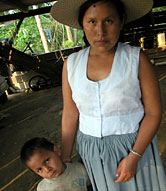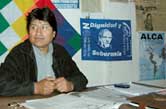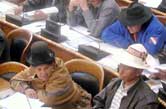
An indigenous Bolivian woman and her child are shown above. Indigenous peoples are disproportionately poor and uneducated in Bolivia and throughout South America. |
What are the key issues facing Bolivia and other South American nations as they seek to trigger equal economic opportunity for all their citizens?
By Juan O. Tamayo
August 7, 2003
One year after Evo Morales, a leftist Aymara Indian and coca growers’ advocate, came in a close second in Bolivia’s presidential election, it’s interesting to speculate on just where he would stand today on Latin America’s political spectrum if he had won.
Would the charismatic Morales still rail against the International Monetary Fund (IMF) and American “imperialism”? Or would he be following the footsteps of other Latin American “leftists” who, after winning the presidency, chose the pragmatic path of continuing free-market policies and cultivating friends in Washington?
In other words, would he have followed the way of President Hugo Chávez, whose fiery populism has polarized and paralyzed Venezuela, or the path of Luiz Inacio Lula da Silva (known as “Lula”) and Lucio Gutierrez, whose early days of rule in Brazil and Ecuador, respectively, have been marked by surprising moderation.
Galvanized by the failures of market reforms in the 1980s and ’90s; stagnant economies; frustration with corrupt, elitist governments; and the Bush Administration’s foreign policies, Latin America is swinging leftward. Six countries elected at least nominally left leaning presidents in the past three years — Argentina, Brazil, Chile, Ecuador, Perú, and Venezuela — and polls show El Salvador and Panama could follow next year.
Yet the region’s new left (in Spanish, “izquierda”), with the glaring exception of Venezuela, has been marked not by the utopian revolutionary socialism of the 1960s and today’s Cuba, but by policies that are socially responsible yet pragmatic — an “Izquierda Lite.”
Bolivia, in some ways, faces challenges almost unique in Latin America. It has the region’s largest indigenous population, perhaps 70 percent of its 8.3 million people, with 69 percent living in poverty. And under U.S. pressure, it has pledged to eradicate most of its legal coca farms that provide a livelihood to tens of thousands of families and the leaves that are sacred to the indigenous people. In contrast, coca farming in Colombia has always been illegal except for the small Arhuaco tribe in the Sierra Nevada.
Morales, 43, and his Movement Toward Socialism (MAS) made their political mark by leading sometimes violent cocalero protests against the eradication efforts, and his stunning success in the 2002 elections helped Indian candidates increase their representation in Congress from 10 to 30 percent.
Yet Bolivia also faces many of the same problems as the rest of Latin America: motionless economies, onerous foreign debts, rising poverty and unemployment, forsaken public education and health systems, shortages of electricity, drinking water and sanitation services, stultifying bureaucracies, enfeebling corruption, violent land disputes, and disenfranchised minorities.
There’s chronic civil warfare in Colombia, mayhem and bloodshed in Venezuela, a renascent Shinning Path guerrilla movement in Perú, the aftermath of economic breakdowns in Argentina and Brazil, inertia in Mexico, and the whiff of trouble in Chile, long the region’s best economic performer.

Congressman Evo Morales is a leading activist for the rights of indigenous people, including the country’s many coca growers, in Bolivia. |
Little wonder, then, that neoliberalism is now almost an epithet, that demands are growing for the renationalization of state companies privatized in suspiciously murky deals during the 1980s, and that opposition to the U.S. war in Iraq has energized youths throughout the region. It’s no surprise that Mexican President Vicente Fox’s business-oriented National Action Party took a beating in midterm elections July 6, while two left-of-center factions scored big, the Institutional Revolutionary Party and the Revolutionary Democratic Party.
Yet beneath all that lies evidence that this left is very different — not violent or radical but pragmatic, seeking social progress and indigenous rights but using Che Guevara’s image more as a fashion statement than a sign of a true belief in revolution. The prime example of this tectonic shift is Lula, a former metalworkers’ union leader who lost three previous runs for the presidency with fiery promises of vast social welfare programs, threats to renounce Brazil’s foreign debt, and attacks on freemarket reforms as inhumane.
He gave Cuban President Fidel Castro a place of honor at his inauguration on January 1, but is today fighting to trim budget deficits, boost the autonomy of the Central Bank, and reform a costly pension system that allows some government employees to retire with full pay at age 50. His cabinet picks won praise from Wall Street, and he has visited Washington twice in seven months to establish what he calls a “respectful” relationship. While his pragmatism angered some of his radical supporters, he seems undeterred. “I’m fed up with Latin American presidents who blame the disgraces of the Third World on imperialism. That’s stupid,” Lula said recently.
Just as surprising was the turnaround of Ecuador’s Gutierrez, a populist former army colonel who led a military coup in early 2001 and won election in November 2002 with the support of the Pachakutik-New Country Movement, a radical group rooted in the 25 percent of Ecuador’s 13.4 million people who are indigenous. Another 65 percent is of mixed indigenous-European descent.
Gutierrez has reached a $200 million deal with the IMF that requires him to balance the budget by cutting government spending, increasing gasoline and utility prices, and turning over the management of electricity and telephone services to the private sector — all no-nos for any populist. Ecuador’s economy is expected to grow 3.5 percent this year, which would be the region’s highest expansion.
In Argentina, President Nestor Kirchner went after the military, police, supreme court, and tax evaders after he was sworn into office in late May, but made no move so far to roll back the disastrous free-market policies of his predecessor, Carlos Menem. And in Chile, President Ricardo Lagos has changed his country’s economic policies little since he took office in 2000 as the first leftist elected since General Augusto Pinochet surrendered power.
Their promising performances are in sharp contrast with that of Perú’s Alejandro Toledo, his nation’s first Indian president, a Stanford-educated former shoeshine boy elected in 2001 on a promise to eradicate the corruption and mismanagement that characterized former President Alberto Fujimori’s 10 years in power. Toledo’s popularity ratings are down to 12 percent amid charges that he has done nothing to improve the economy, named cronies to senior jobs, and engaged in some of the same sleazy politicking as Fujimori.
Only Chávez has embraced the kind of leftist rhetoric popular in the 1960s, promising a “Bolivarian Revolution,” holding up Cuba as his ideal, and causing a massive flight of people and capital. The resulting economic slump added 2 million people to the rolls of Venezuela’s poor and drove unemployment from 13 percent to 21 percent. His popularity, once in the high 70s, now stands at about 30 percent.

The increase in political representation of and by Bolivia’s indigenous population reflects a growing trend throughout South America. |
Chávez’s crisis, even if not totally of his own making, appears to have served as an example to other leftist leaders that pragmatic politics may carry the day. Which returns us to the question of where Evo Morales would stand on this wave of talk-left, walk-center presidents.
An an example, Morales has staunchly opposed construction of a pipeline that would flow Bolivia’s vast natural gas deposits from the landlocked nation to a Chilean port where it would be liquefied for export to California. He argues that the gas should be sold at home to help domestic industries, and that the government should establish new processing plants that would create more jobs and turn the gas into value-added products such as liquid fuels, fertilizers, and plastics.
But Bolivia has more than enough gas for both domestic use and export, and has long sold to Argentina and Brazil, facts that have raised complaints that Morales’s objections are more political: Chile has been Bolivia’s nemesis since it seized Bolivia’s coastal region in the 19th century, and California is an iconic part of the United States.
As a president, then, one has to wonder if Morales would really pass up the pipeline’s projected $21 billion in sales over 20 years, a bonanza to his impoverished nation. Should Evo Morales ascend to the presidency, he will confront this and many other complex issues that pit populism against pragmatism.
Juan O. Tamayo is Senior Correspondent for the MIAMI HERALD.
